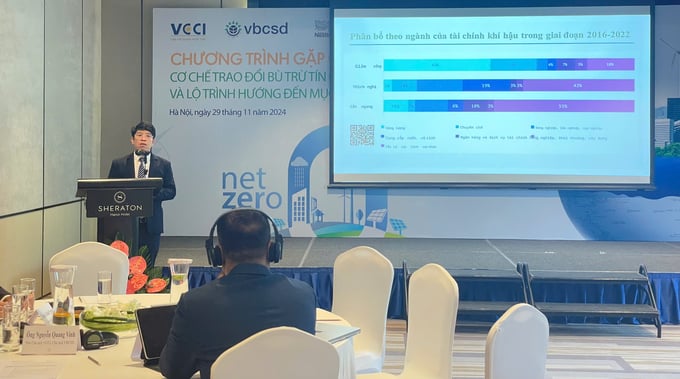November 27, 2025 | 00:45 GMT +7
November 27, 2025 | 00:45 GMT +7
Hotline: 0913.378.918
November 27, 2025 | 00:45 GMT +7
Hotline: 0913.378.918
On November 29, as part of the Vietnam Sustainable Business Forum 2024, a meeting and discussion were held on the carbon credit trading mechanism in Vietnam and the roadmap toward the Net Zero 2050 goal.

The program not only focuses on implementing the carbon credit trading mechanism but also serves as an opportunity to assess Vietnam's roadmap and strategies for responding to climate change.
Mr. Binu Jacob, Co-Chairman of the Vietnam Business Council for Sustainable Development (VBCSD) and General Director of Nestlé Vietnam, emphasized that climate change is a global challenge requiring decisive action starting today. For Nestlé, sustainability is not just a strategy but a core value of the company.
“We have implemented comprehensive initiatives such as optimizing supply chains, investing in renewable energy, and calling for strong collaboration across the value chain to achieve emission reduction goals. The journey to reduce emissions cannot succeed with isolated actions but requires the collective efforts of the entire value chain, especially from pioneering businesses in sustainability,” Mr. Binu Jacob affirmed.
Sharing the same perspective, Mr. Nguyen Quang Vinh, Vice Chairman of VCCI and Chairman of VBCSD, highlighted that in the context of globalization, businesses play an increasingly crucial role in sustainable development. Leading companies like Nestlé, Coca-Cola, and Vinamilk have set an example by adopting emission reduction reporting based on scientific foundations, rather than merely complying with regulations.
Calculating carbon emissions and implementing offset measures is not only a pressing requirement of the times but also a key factor for businesses to survive and thrive in the green economy.
Therefore, close collaboration between the business sector and government authorities is essential to minimize impacts on biodiversity and ensure a balance between economic growth and environmental protection.

Vietnam is committed to achieving net zero emissions by 2050. Photo: NVL.
Sharing insights on the carbon credit trading mechanism, Mr. Nguyen Dinh Tho, Director of the Institute of Strategy and Policy on Natural Resources and Environment, emphasized that the carbon market is not only a vital tool for reducing emissions but also provides financial opportunities for developing countries.
"Although developed nations pledged USD 300 billion annually to support developing countries at COP29, this amount falls short of the estimated USD 2.4 trillion needed each year from now until 2035. For Vietnam, mobilizing sufficient financing for sustainable development goals remains a significant challenge," Mr. Tho noted.
This challenge is particularly evident as Vietnam has yet to fully capitalize on the potential of its key industries, such as textiles, which face substantial losses due to non-compliance with green standards.
Additionally, technological capacity and workforce readiness in the climate sector still lag behind requirements. Vietnam must urgently enhance training capacity and prepare for carbon credit reporting and trading, set to be piloted in 2025 and mandated for major emitters by 2030.
Regarding the roadmap, Mr. Nguyen Thanh Cong, Deputy Head of the Economics and Climate Change Information Department under the Ministry of Natural Resources and Environment, explained that Vietnam's carbon market will comprise two segments: a compliance market based on emission quotas allocated by the government, and a voluntary market where businesses invest in green technologies to generate carbon credits.
The pilot phase will initially target about 150 major emitting facilities, granting them 100% free emission quotas. During this period, businesses will also be allowed to offset up to 20% of their quotas using carbon credits.
However, to fully leverage opportunities from the carbon credit trading mechanism, Vietnam must establish clear policies, foster international cooperation, and raise awareness among businesses about the market's significance.
Experts believe that the carbon market not only alleviates environmental pressures but also offers substantial financial benefits, enabling businesses to transition to green technologies without bearing excessive costs.
Translated by Kieu Chi

(VAN) The Mekong River Commission adopts the 2026 - 2030 Strategic Plan with a people-centered approach.
/2025/11/26/1720-1-200855_132.jpg)
(VAN) Viet Nam and Japan have many conditions to expand cooperation on climate change adaptation, particularly in disaster risk management based on advanced technologies.

(VAN) The strong development of digital technology and artificial intelligence is opening up opportunities to transform science and technology into a 'Magic eye' for disaster forecasting and early warning.

Applying vaccines and proactive disease prevention helps pig herds stay healthy, maintain productivity, reduce risks, and decrease reliance on antibiotics in modern livestock farming.

(VAN) Many advanced agricultural technologies and products were shared at the Viet Nam - South Korea Agricultural Technology Introduction, Trade Promotion, and Connection Seminar 2025.

(VAN) Minister Tran Duc Thang hopes to strengthen connections and exchanges with China in agriculture and environment sector through the Embassy of Vietnam in Beijing.

(VAN) After 50 years of strategic cooperation, Viet Nam and UNICEF remain committed to promoting fair and inclusive development for all children in the digital future.